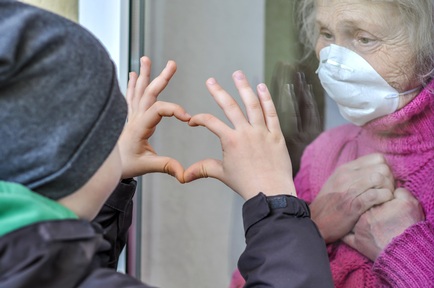Nearly a year after indoor visits stopped, families plead for care homes to re-open
It has been nearly a year since face-to-face indoor care home visits were stopped to keep residents safe from coronavirus and now relatives have renewed their plea for care homes to re-open so ‘they can touch their loved ones’.

Campaign groups and charities have issued a joint statement calling for a deadline of 1 March for action on care home visits.
The statement by Age UK, John’s Campaign, National Care Forum, Relatives & Residents Association & Rights for Residents, says ‘as we see coronavirus case numbers falling, we appeal for urgent and united action to re-open care homes. Getting back to a position where everyone can receive meaningful indoor visits is a matter of safety, common decency, and fundamental human rights.
‘As a first step towards a wider process of 'opening up', we believe that this must be in place for all residents and their essential caregivers by the 1 March.’
The statement goes on to say ‘if we delay any longer, many residents will have waited more than a year to see and touch their loved ones. This is unacceptable and cannot be allowed to continue. The absence of meaningful indoor visiting fails to recognise the fundamental role that relationships and love play in a resident's wellbeing.’
'Families need to be given status of essential caregiver'
The campaigners want to see families given the status of ‘essential caregivers’ saying ‘they should be recognised as central to the person’s care; enabled to provide the support crucial to the health and well-being of their loved one; and provided with relevant PPE and testing in line with the safety measures applied to the staff.
Helen Wildbore, director of R&RA (Relatives & Residents Association), said: “Almost a year of isolation is having a devastating impact on older people in care. Our helpline hears the distress, despair and heartbreak of separation, and the desperation for a light at the end of the tunnel. We must safely reconnect families and friends, to stop the human rights crisis unfolding in care.”
The majority of care home residents in the UK have now been offered the COVID-19 vaccine and the number of people dying in care homes dropped last week in England from the week ending 29 January from 1,808 to 1,365 in the week ending 5 February.
Vaccine will take a few weeks to have an impact on death rates
Public health expert Professor Linda Bauld believes it will be a couple of weeks before we start to see the impact of the vaccine as it takes about 10 days for protection to start to build up in the body.
She says most people will have a "reasonable level of protection" after 21 days but this could take even longer in older people with complex immune systems.
Due to this she expects that in a couple of weeks “these numbers to be going down hugely”.
The campaigners say in their statement: “Ultimately it is impossible to entirely eliminate risk. Providers, commissioners, relatives, friends, regulators and the wider public must recognise this as a shared priority – holding a collective responsibility for what we know is right for humanity.”
Some care homes have installed visitor pods in their grounds to enable visits behind screens to take place and in warmer weather they were holding garden visits.
Small number of care homes already allowing 'meaningful visiting'
Kepplegate care home in Lancashire is one of small handful in the country that are facilitating close contact visits.
It states on carehome.co.uk: 'All family carers will be included in weekly PCR COVID Swab testing and will also be offered a rapid test on each visit to allow close contact, person-centred visiting.'
Kate Lee, chief executive of the Alzheimer’s Society has written an open letter to Matt Hancock, the Secretary of State for Health and Social Care, calling for a clear timetable and process for re-introducing meaningful visits to care homes.
Last year the Alzheimer’s Society carried out a report in the wake of indoor care home visits being stopped, revealing relatives of those with dementia in care homes had spoken of their loved ones feeling confused and abandoned, stopping eating and losing the ability to speak. One man told the charity he was “fearful my wife won’t recognise me at the end of this”.
Latest News
 29-Jul-24
Dementia Bus gives carehome.co.uk staff insight into life with dementia
29-Jul-24
Dementia Bus gives carehome.co.uk staff insight into life with dementia
 01-Mar-24
Find out the top care homes in 2024
01-Mar-24
Find out the top care homes in 2024
 21-Mar-23
UK's top care homes in 2023 revealed
21-Mar-23
UK's top care homes in 2023 revealed
 03-Jan-23
carehome.co.uk launches free care helpline
03-Jan-23
carehome.co.uk launches free care helpline
 13-Dec-22
5 mins with Emily Whitehurst, chief operating officer for Constantia Healthcare
13-Dec-22
5 mins with Emily Whitehurst, chief operating officer for Constantia Healthcare